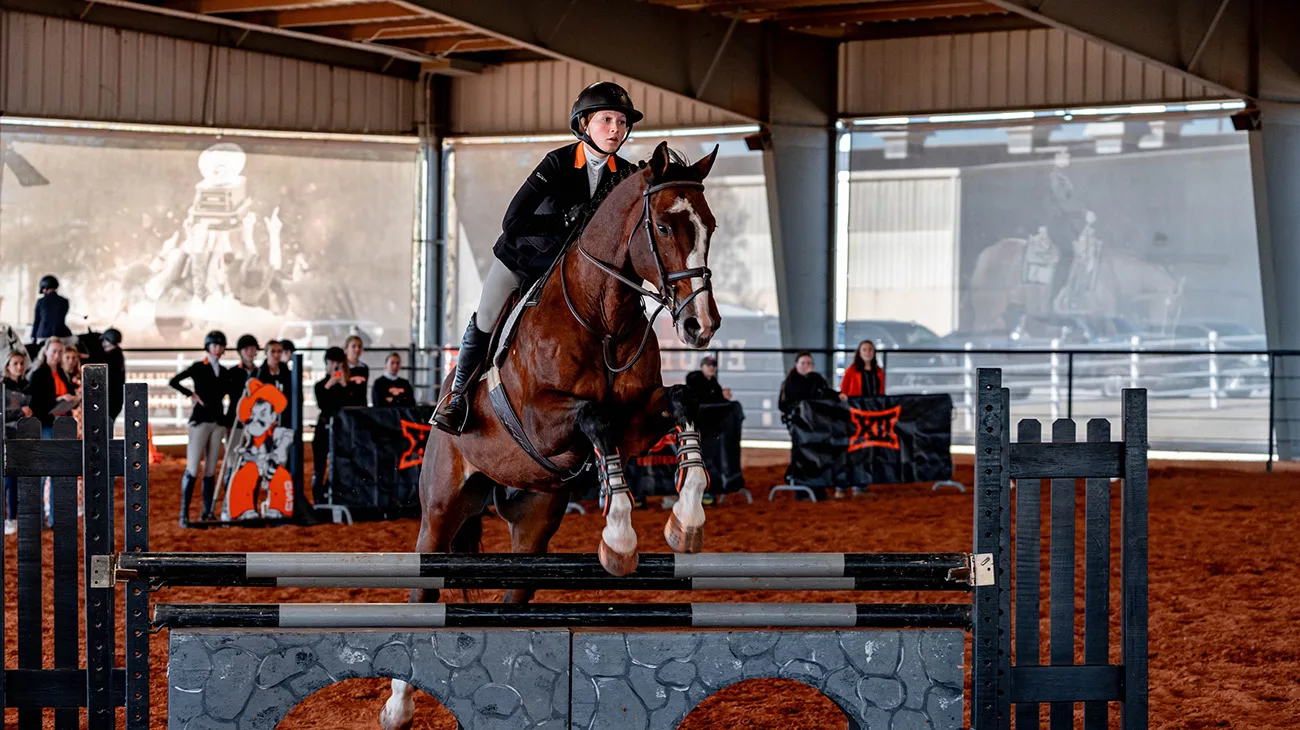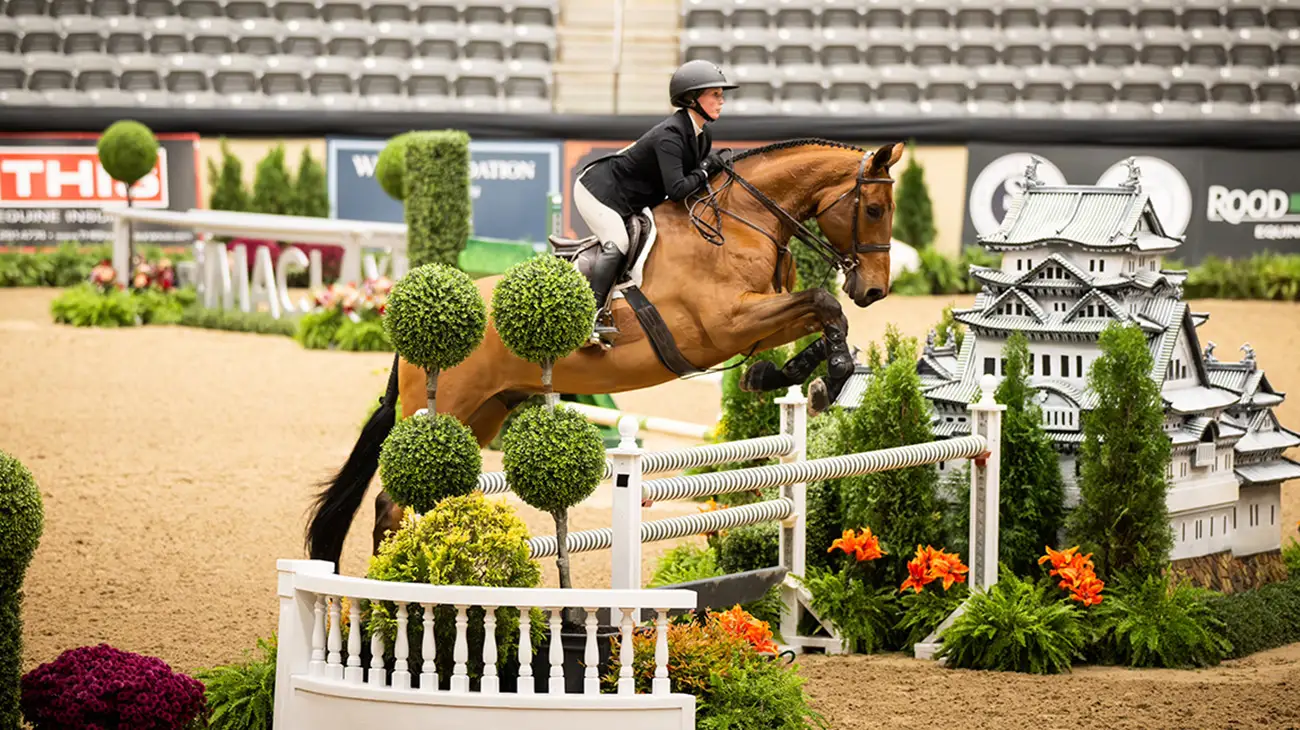Emma Hechtman started her day July 19 aboard Iglesias O.A. in the low junior jumper ring at HITS Saugerties (New York). After setting the pace for the class, the 18-year-old Heritage Farm working student hopped off and headed back to the barn to hack another horse, leaving her mom, Jill Hechtman, at the ring to wait for the results.
After trotting around a few times on the next horse, Emma gently asked the mare to lengthen her stride.
“Suddenly the mare tripped and went down on her right shoulder. I went down with her and broke my fall with my right shoulder,” said Emma, who was wearing an air vest at the time. “Then the mare somersaulted, and part of her body landed on my side, which was directly on my pelvis. I was running on adrenaline at the time, so initially, as I laid on the ground, I didn’t feel anything.”
But when Emma tried to stand, something was horribly wrong.
“I realized that I couldn’t move, which was a scary feeling,” she said. “I remember yelling out to someone to grab the horse and saying that I needed help. A bunch of people ran over; I don’t remember seeing their faces.”
Within minutes, her mother and trainers from Heritage Farm—Andre Dignelli, Patricia Griffith and Laena Romond—arrived.
“I had never seen Andre so scared before,” Emma said. “And that’s one thing that really scared me, because I remember looking over and seeing him and Laena—their faces were white. And I remember thinking to myself, ‘OK, this is not good. What is wrong?’ ”
Paramedics determined Emma did not have a concussion, then evaluated her for broken bones.
“I had to reassure everyone that my head was fine, and I had not hit it during the fall,” Emma said. “I was cracking jokes the entire time with the paramedics. They knew I had broken something and that I needed to go to hospital. I ended up finding out at the hospital that I had won the low junior jumper class that morning, too.”
Emma was whisked off to Albany Medical Center (New York), a Level 1 trauma center, where her medical team determined she had a bilateral pubic rami fracture, a left sacral alla fracture in her pelvis, and a fractured and displaced collarbone.
A few days later, Emma flew back to Florida, where her orthopedic surgeon Dr. Nicholas Sama used a plate and eight screws to repair Emma’s fractured collarbone. Sama estimated her collarbone would take four to six weeks to heal, and her pelvis, which did not require surgery, would take eight weeks.

The recovery window dashed Emma’s summer horse showing plans. Even more, she was worried about making it to the fall equitation finals, which loomed on the horizon.
“My eight-week mark was right when Zone 2 ASPCA Maclay Regionals were,” Emma said.
ADVERTISEMENT
Prior to her injuries, Emma had qualified for almost all of the fall 3’6″ equitation finals.
“For me, the thing that hurt the most mentally was that I had gotten so far in my riding, and I wasn’t ready for the summer to end,” she said. “I was so happy where I was.”
As Emma tried to navigate her new normal, Dignelli offered encouragement.
“I said, take a breath,” he recalled. “It all seems catastrophic right now, but the body has a way of healing itself, and let’s not get ahead of ourselves.”
While Emma began her recovery, the Heritage team kept Kingsroad, her equitation horse, fit on the off chance she could recover enough to compete.
“I wanted to be prepared either way,” Dignelli said. “Had we not had the right horse for Emma, we may have felt differently [about this plan]. But we had a horse we trusted for her, and we felt confident in his abilities. We wanted to make this happen for her.”
Determined to make it to the equitation finals, Emma turned her full attention to her rehabilitation.
“I couldn’t walk correctly for a long time, because when I tried to walk correctly, I had radiating pain down my body [from my pelvis],” Emma said. “So I had to relearn how to walk in physical therapy; I had to strengthen my right shoulder again, and I basically had to do that in three weeks’ time before I went to Oklahoma State University.”
Because of Emma’s collarbone surgery, she could not use a cane or walker to support her during recovery. While she could walk short spurts at home, she needed a wheelchair for long distances.
Three weeks after Emma’s surgery, she made it to move-in day at OSU in Stillwater. Many of her National Collegiate Equestrian Association teammates helped her move her things into her dorm and get settled. She couldn’t participate in any workouts or riding for several weeks, but the school’s athletic trainer, Erin Simmerman, and sports medicine doctor, Dr. Jason Moore, took charge of her rehab.

“They helped guide me through my recovery—they all rallied behind me to help me get to regionals,” Emma said. “The support from everyone at OSU—my NCEA coaches Larry Sanchez, Carter Anderson and Alle Durkin and my teammates—and my trainers at Heritage was absolutely incredible.”
By the six-week mark, Emma was able to flat a horse at OSU for the first time and by week eight, she was back in New York at the Old Salem Horse Show for Maclay regionals. Griffith, who had the same collarbone surgery in September 2023, remembers telling Emma to pace herself as she started riding again, knowing she might tire faster.
“You do have to push yourself a little bit—you don’t want to be reckless, but you do have to relearn it,” said Griffith. “[At first] you think, am I ever going to be OK? And then one day you just are. I told Emma to rest for a minute, but to not be afraid after her surgery to push herself a little bit. You have to strength train to get back to yourself. She slowly pushed herself and did a little more each time.”
ADVERTISEMENT
“I didn’t get full strength back for a while,” Emma said. “[At first], when I would go to put my left leg on [the horse]—that’s where my biggest fracture was—there was no power. The horse wouldn’t move off of it; there was no strength there. That was pretty frustrating.”
Nonetheless, Emma placed sixth at regionals with Kingsroad, earning them a trip to the ASPCA Maclay Final at the National Horse Show (Kentucky).
It was especially gratifying because “Roady,” an 11-year-old Holsteiner gelding (Kannan—Monata) owned by Elin Uppling, had also spent part of the summer recovering from a mild injury.
“Everyone at the barn was calling us ‘the Comeback Kids,’ ” Emma said. “It was really exciting to get a ribbon [at regionals]. I couldn’t have done it without all of the support I had from everyone.”
With their successful trip to regionals, the “Comeback Kids” were on the road to the fall equitation finals that Emma once worried had vaporized after her accident.
They first competed in the equitation at Capital Challenge (Maryland), then headed to the Dover Saddlery/USEF Hunter Seat Medal Final at the Pennsylvania National. There, she had a great trip and made one of the stand-by lists, but a swap ultimately kept her out of the second round.
Three weeks later, they were in Kentucky for the National Horse Show and her first Maclay Final. While similar problems kept them out of the stand-by there, Emma was happy with their performance.
“Both Roady and I had never done [the 3’6”] equitation finals before, so being able to go, even after the accident, was such a huge accomplishment,” she said. “Andre was happy; I was happy; it all worked out.”

Thinking back on the accident, Emma is grateful to her father, Jason Hechtman, who is a breast cancer surgeon, for teaching her how to properly fall off of a horse at a young age.
“I’m 5’2” on a good day now, so I was really tiny as a kid,” Emma said. “When I first started riding, my dad was really nervous about me getting hurt when I fell off. As a doctor, my dad is also trauma trained. He taught me to brace with my shoulder on impact so I would protect [the rest of my body], because your shoulder can take the brunt of the fall. I unconsciously fall that way now, and I think that’s one thing that saved me in my accident this time.”
Throughout Emma’s recovery, the Heritage team admired her determination and dedication.
“When things don’t go right, which is over 50% of the time with horses, she’s able to process and learn from it,” Griffith said. “And Emma was able to do the same thing with her accident: put it behind her and keep moving forward. Sometimes with an injury, you get set back mentally. But Emma was not that way—she was ready to keep moving forward and make it happen. And that’s what helped her succeed.”
Do you know a horse or rider who returned to the competition ring after what should have been a life-threatening or career-ending injury or illness? Email Kimberly at kloushin@coth.com with their story.














